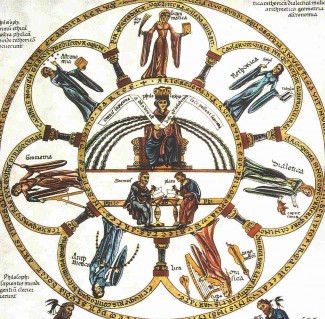Having had a day off last week in honor of the past presidents, I am loathe to disagree with former presidents (in this case, of the American Historical Association). But a post on the value of liberal education (via John Fea), based on the remarks of William Cronon, former president of the AHA, has me wondering if academics are as gullible as viewers of Fox News. I know that sounds harsh, but if you look at Cronon’s list of a liberal education’s outcomes, you do wonder if scholars sometimes shut down critical thought when estimating their own duties:
1) Liberally educated people listen and hear. They pay close attention to others and show empathy.
2) Liberally educated people read and understand. They possess the ability to read not only the written word but also the visual world that surrounds them.
3) Liberally educated people can converse with anyone. They are able to speak on many topics and are interested in listening as well.
4) Liberally educated people can write clearly, persuasively, and movingly. They are able to express themselves in writing, not just in the technical sense of correct grammar and syntax but in conveying their inner selves.
5) Liberally educated people can solve problems of various kinds. They can deconstruct complicated problems and reconstruct them into something meaningful.
6) Liberally educated people respect rigor as a way of seeking truth. They value wisdom and seek to combine knowledge and values.
7) Liberally educated people are humble, tolerant, and self-critical. They recognize and value different perspectives.
8) Liberally educated people accomplish something with their lives. They see a higher purpose in their time on earth and do something to improve it before they die.
9) Liberally educated people understand the power of community. They acknowledge that individuals cannot operate outside of communities and that communities do not exist without individuals. Cronon adds later in his essay, “Education for human freedom [i.e., individualism] is also education for human community” (5).
10) Liberally educated people connect. As Cronon puts it, a liberal education “means being able to see connections that allow one to make sense of the world and act within it in creative ways. . . . [It] is about gaining the power and the wisdom, the generosity and the freedom to connect.” (3-5)
The old Beach Boys song, “Wouldn’t it be Nice,” is running painfully through my head.
Some of these higher education happy thoughts may be true when it comes to certain skills that liberally educated students receive, as in reading, writing, and thinking (though they miss just as many undergrads as they hit). But number seven’s warm fuzzy, “Liberally educated people are humble, tolerant, and self-critical. They recognize and value different perspectives” makes absolutely no sense of many professors who are liberally educated as well as the string of academic novels that feature scholars who are proud, myopic, judgmental, and overly protective of reputations and office hours.
At the same time, this list, while patting those involved with liberal education on the back, doesn’t seem to acknowledge that the students who come to liberal arts institutions do so by way of families who have inculcated many of the virtues touted in this list — even some of those critical skills attributed to liberal education. It seems to me that any proper evaluation of a liberal education concedes that time at college mainly refines what has already gone on in the life of a student before enrollment. Lights may go on in the case of discovering authors and important texts, but the virtues that a society needs from its members are more often learned from parents, teachers, and clergy, than from hyper-sensitive and ambitious faculty teaching the Great Books.






5 comments
David Naas
Albert Jay Nock — now THERE was a liberaly educated gentleman.
JimWilton
The list can only be read as aspirational. But even viewed in that way, errs in turning tolerance into an abstract virtue. Surely there are things that need not be tolerated. Surely, fixation on one’s one views (and pride) is not the only obstacle to tolerance. Sometimes another view is incorrect or harmful and must be destroyed.
I am a great advocate of liberal education. College is where many come to think for the first time — and where some think for the last time. But these aspirations need some work.
Ray Olson
Mr. Travers is certainly right, but the problems he points to have been burgeoning since the end of World War II. That is, they are current but also as old as an early baby boomer such as I. Paul Goodman, the great social critic of the 1950s and ’60s, wrote many books concerned with those problems and the additional problems they spawned–People or Personnel, Growing Up Absurd, Compulsory Mis-education, The Community of Scholars. The de-schooling movement of the 1960s addressed those matters, as well; see the work of Ivan Illich.
Goodman said that the faith in formal education under which we still labor is “a superstition.” He did not, that I recall, say what I have said of higher education, that it is the biggest and most malign growth industry of the post-war period. It has become more obvious to me with each passing decade that the primary reason formal education resists fixing is that it’s too profitable, not necessarily only in moneymaking terms, for the power elites to allow it to be changed. Aside from a kind of diverse, dispersed, grassroots devolutionary revolt against formal education–higher ed, in particular–I’m too myopic or stupid to see how the university-corporate financial complex can be challenged and, one hopes, broken up. Oh, that the Wobblies at their most anarchistic were still around to inspire us!
As for the speciousness of Mr. Cronon’s list, I, too, find the seventh item the most laughable. But the first, third, and sixth are almost the seventh’s match in preposterousness, as anyone who respects, studies, and honors religion, tradition, and human cussedness surely knows.
dave walsh
I remember the Medaille post about The Learning Knights of Bell Telephone. I think the op-ed piece Medaille referenced fairly accurately depicts the goals and effects of exposure to liberal arts. The author, Wes Davis, also sees the source of the difficulties the programs have faced and will face for some time to come.
link:
http://www.nytimes.com/2010/06/16/opinion/16davis.html?pagewanted=all
Chris Travers
There’s liberal education and then there is liberal education. The big problem today is that education is losing its soul at the hand of commerce and what has in the past been a system designed primarily to teach exactly the things mentioned is decaying into what is, essentially, a glorified vocational education system.
It’s not that there is anything wrong with vocational education. In fact I think we need more honest vocational education and it needs to take a variety of new forms including apprenticeships. However, vocational education and liberal education are not the same thing and in many cases are not even compatible. There’s nothing wrong with teaching, say, computer science in the abstract, but does not teach people to program (and teaching people to program is not teaching them computer science). Worse, when we charge top dollar for an education whose primary value is in being able to tell the HR department “I have a college degree in the field you want one in” this doesn’t really encourage quality education either.
The sad thing is that our entire economy is built on the lie that liberal education does all these things. I laugh when I see job ad that says that they want people with computer science degrees to implement content management systems or the like and then hear people complain about how few people are going into STEM fields instead of the humanities. Not only are the academics gullible but they have bought a lie that they are in fact selling.
Comments are closed.